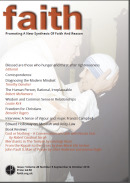Book Reviews: Murky Money in the Vatican
Merchants in The Temple,
by Gianluigi Nuzzi, Henry Holt, New York. 225pp. $ 32.50 (£22.50).
Reviewed by James Tolhurst
Gianluigi Nuzzi and fellow journalist Emiliano Fittipaldi went on trial before three judges in the Vatican criminal court. They were not accused of falsifying facts, which the Vatican has not denied, but of "illicit behaviour in obtaining information and organized criminal association." This goes a long way to explain Pope Francis’ singularly blunt attacks on the Curia. The court eventually ruled that it had no jurisdiction over them since they were not citizens of the Vatican City.
Nuzzi has already published Vaticano SpA and Sua Santitá
His latest book is Via Crucis published in English with the more lurid title Merchants in The Temple. In it, Nuzzi argues that the Curia is in such a mess that it caused Benedict’s resignation and is virtually bankrupt owing to financial mismanagement.
Pope Francis is of sterner stuff and determined to drag the institutions of the Vatican into solvency and probity. In 2013 he established the Commission for Reference on the Organisation of the Economic-Administrative Structure of the Holy See (COSEA) under Joseph Zahra. The secretary was Monsignor Lucio Angelo Vallejo Balda, now one of the defendants alongside Nuzzzi and Fittipaldi.
Burglary and hidden microphones
The Commission found its investigation frustrated from the beginning, with dicasteries reluctant to reveal proper financial audits and the Secretary of State eventually in conflict with Cardinal George Pell’s Secretariat for the Economy, whom Nuzzi terms unkindly the ambitious bulldog from Sydney. (He has worse things to say about Cardinals Bertone, Burke, Calcagno, Levada and Parolin). As if this was almost part of a film plot, in March 2014 a burglary occurred at the office of Monsignor Vallejo of COSEA in which the thieves seemed to have the necessary keys to the building and were able to target the particular locker which held confidential documents. Hidden microphones were later discovered in some offices of the Prefecture for the Economic Affairs of the Holy See (the control centre for financial operations).
The Vatican does not deny the veracity of documents which have been revealed, merely the method used in obtaining them. Exactly who was responsible for the burglary or the bugs remains uncertain. Various suspects would include interested curial officials (desirous of knowing what evidence there was of financial irregularity), interested parties who had business dealings with the Vatican, financial and perhaps criminal associates anxious to know to what extent their connection was known.
Merchants in the Temple is pure journalese, but scattered among its pages among the asides and suggestions are many juicy facts. Nobody suggests that the Curia ought to be like The Bells of St. Mary’s, but this book reveals an attitude of clerical righteousness combined with a contempt for financial niceties. The conclusion of COSEA in 2014 was that there was a general "lack of governance, control and professionalism." It would appear that normal practice for work was not to ask for several quotations: "Competitive bidding is limited to 5-10 companies that have always worked with the Vatican. No public announcements are posted. When the works are being done there is no budgetary ceiling and no item-by-item cost estimate." It is also clear that no real financial control was exercised for instance in Vatican Radio or L’Osservatore Romano, and debts were rolled over from year to year. 58% of Peter’s Pence was used to top up deficits in other dicasteries.
Creative accountancy and the ‘long togas’
The Pension Fund for Vatican staff was also virtually bankrupt, with a deficit of €700-800 million. Money was invested sometimes in companies with a bad track record, in one case losing over 50%; but €94 million was found to be floating around between various departments. Property owned in London with a market value of €73 million was entered on the books at €38.8 million; Swiss properties valued at €49 million were written down at €18 million. Such creative accountancy could be regarded as fraudulent. Although there should be no more than 6,000 discount cards for Vatican employees’ use in their duty free stores, the actual number was 41,000. 14% of tobacco sales was registered to one unspecified card holder. The auditors reported: "During the last two years, there have been 1.6 million euros in losses, on the basis of warehouse discrepancies." This implies shoplifting on a large scale. In the Congregation for the Causes of Saints two lay postulators were responsible for 180 causes, and the recommended printing press
Nova Res was owned by one of them. All very cosy and far from fragrant. Nuzzi comments "The Curia is like a soft belly, absorbing and normalizing any attempt at change. Inertia is its default mode... The people who made this material available to me did so because they are pained by the deeply rooted hypocrisy they see in the Vatican... Every day they observe the huge gap between what Francis has promised and what is being done to hinder his reforms and undermine his credibility... The long togas tend to minimize everything lay people say, no matter how well supported it is by data and careful audits. ‘The Church does not consist of numbers but of souls’; this is the generic response of the cardinals when a lay official allows himself to make a criticism."
Those who are acquainted with the ecclesiastical nomenclature will neither be surprised at the revelations nor at the battle now raging. It may result in Pope Francis being a casualty like his predecessor, or a renewed and more transparent bureaucracy. At the moment there is a stalemate. Nuzzi will probably not serve anything like eight years; Benedict pardoned his butler, Paolo Gabrieli and sends Christmas presents to his children. The book unfortunately has no index, which would greatly help to untangle what still reads like something out of The Godfather.
Notes:
Fr. James Tolhurst has been a parish priest and a seminary Spiritual Director and is a former Book Reviews Editor of Faith Magazine.


